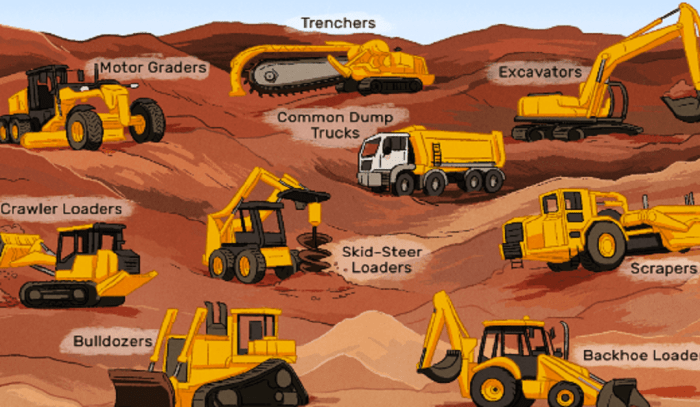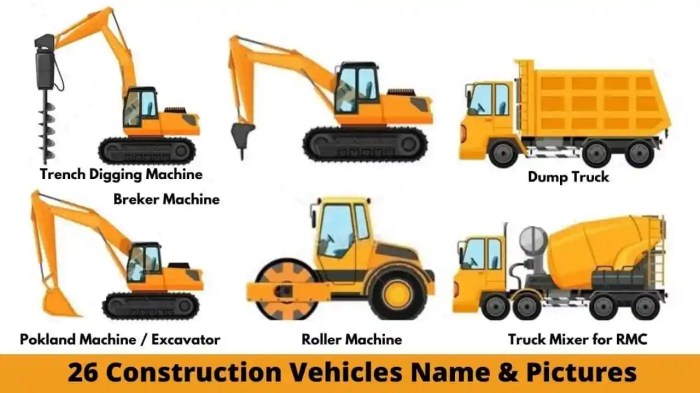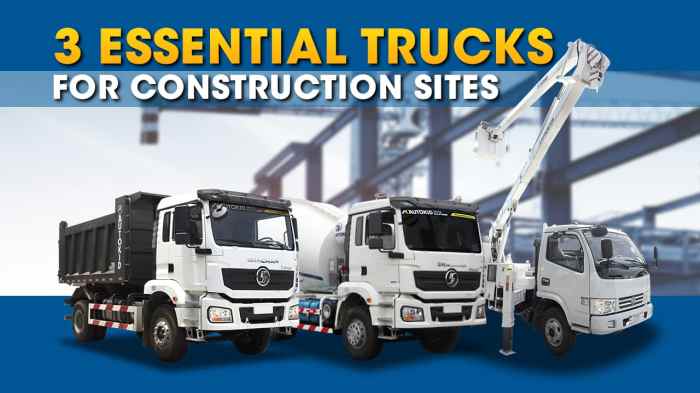Comparing construction trucks vs other vehicles sets the stage for this enthralling narrative, offering readers a glimpse into a story that is rich in detail and brimming with originality. Construction trucks are designed for heavy-duty tasks, but how do they differ from other vehicles in terms of purpose, design, performance, and safety features? Let’s delve into this intriguing comparison to uncover the unique characteristics that set construction trucks apart.
As we explore the differences between construction trucks and other vehicles, we will uncover the specific functions, design elements, performance metrics, and safety features that make each type of vehicle distinct in its own right.
Comparing the Purpose of Construction Trucks vs Other Vehicles: Comparing Construction Trucks Vs Other Vehicles
Construction trucks and regular vehicles serve different purposes based on their design and capabilities. Construction trucks are specifically built to handle heavy-duty tasks in construction sites, while regular vehicles are meant for general transportation purposes.
Construction trucks are equipped with unique features that make them suitable for construction work, such as reinforced chassis, larger tires, and specialized attachments like cranes, buckets, or cement mixers. These features enable construction trucks to carry heavy loads, navigate rough terrains, and perform specific construction tasks efficiently.
On the other hand, regular vehicles like cars, vans, or SUVs are designed for everyday use, focusing on passenger comfort, fuel efficiency, and versatility for various road conditions. These vehicles are not built to withstand the demands of construction work and lack the robustness and specialized equipment found in construction trucks.
Examples of construction trucks include dump trucks, excavators, bulldozers, and cement mixers, each serving a specific function in the construction industry. In contrast, examples of regular vehicles range from sedans, hatchbacks, to SUVs, catering to personal or commercial transportation needs rather than heavy-duty construction tasks.
Design and Structure Variations between Construction Trucks and Other Vehicles

Construction trucks are specifically designed to handle heavy loads and navigate rugged terrains, setting them apart from regular vehicles. The design elements and structural build of construction trucks play a crucial role in their functionality and capabilities.
Construction trucks are characterized by their robust and durable construction, featuring reinforced frames and suspension systems to support heavy loads. These trucks are equipped with powerful engines and transmissions to provide the necessary torque and power for hauling materials and equipment on construction sites.
In contrast, regular vehicles are designed for everyday use and are not built to withstand the same level of stress and strain as construction trucks. They have lighter frames and suspension systems, making them more suitable for commuting and personal transportation rather than heavy-duty tasks.
Size, Shape, and Weight Distribution Comparison
Construction trucks are typically larger and heavier than regular vehicles to accommodate the loads they carry. Their size and shape are optimized for efficiency in transporting construction materials, with spacious beds or compartments for easy loading and unloading.
The weight distribution of construction trucks is carefully balanced to ensure stability and safety while carrying heavy loads. This includes features such as reinforced axles, chassis, and braking systems to handle the increased weight without compromising performance.
On the other hand, regular vehicles are designed with a focus on passenger comfort and fuel efficiency, leading to a lighter overall weight and different weight distribution. These vehicles prioritize factors like aerodynamics and handling for everyday driving conditions rather than heavy-duty tasks.
Overall, the design and structural variations between construction trucks and other vehicles highlight the specialized nature of construction equipment and the importance of tailored design for specific functions and requirements.
Performance and Efficiency Contrasts of Construction Trucks and Other Vehicles
Construction trucks are designed to excel in performance metrics such as speed, power, and torque compared to other vehicles. These heavy-duty trucks are equipped with robust engines that provide high levels of power and torque to handle demanding construction tasks efficiently.
Speed
Construction trucks are generally not built for speed but rather for power and endurance. They may have lower maximum speeds compared to other vehicles like sports cars or sedans. However, their acceleration and pulling power are unmatched when it comes to navigating rugged terrains and carrying heavy loads.
Power and Torque
Construction trucks are known for their exceptional power and torque capabilities. The engines of these trucks are specifically designed to deliver high levels of torque at low speeds, allowing them to haul heavy materials and equipment with ease. This makes them ideal for construction sites where strength and durability are paramount.
Fuel Consumption and Workload Capacity
Despite their powerful engines, construction trucks are generally less fuel-efficient compared to other vehicles due to their heavy weight and constant stop-and-go nature on construction sites. However, their workload capacity far surpasses that of other vehicles, making them essential for transporting large quantities of materials and equipment efficiently.
Specialized Features for Enhanced Productivity
Construction trucks are equipped with specialized features such as hydraulic systems, off-road tires, and reinforced chassis that enhance their productivity in construction sites. These features allow them to perform tasks like lifting, dumping, and hauling heavy materials with precision and efficiency, which other vehicles are not designed to handle.
Safety Features and Regulations for Construction Trucks versus Other Vehicles

Construction trucks are equipped with a variety of safety features to ensure the occupational safety of operators and workers on construction sites. These features are specifically designed to mitigate risks and prevent accidents in the challenging and hazardous environments where these vehicles operate.
Safety Mechanisms in Construction Trucks, Comparing construction trucks vs other vehicles
Construction trucks often include features such as roll-over protection systems, reinforced cabs, and advanced braking systems to enhance safety. Additionally, many construction trucks are equipped with cameras and sensors to provide better visibility for operators, especially in blind spots. These safety mechanisms play a crucial role in preventing accidents and ensuring the well-being of workers.
Comparison of Safety Regulations
The safety regulations governing the operation of construction trucks are typically more stringent than those for regular vehicles. This is due to the unique risks associated with construction sites and the heavy machinery involved. Regulations often mandate specific training for operators, regular maintenance checks, and adherence to strict safety protocols to minimize accidents and injuries.
Impact of Advanced Technologies
Advanced technologies like collision avoidance systems have revolutionized safety aspects in construction trucks. These systems utilize sensors and cameras to detect potential hazards and alert operators, helping to prevent collisions and accidents. In contrast, such technologies are not as prevalent in regular vehicles, highlighting the emphasis on safety in construction truck design and operation.
Final Conclusion

In conclusion, the comparison between construction trucks and other vehicles highlights the specialized nature of construction trucks, showcasing their ability to handle heavy loads, rugged terrains, and enhance productivity in construction sites. Understanding these distinctions can provide valuable insights into choosing the right type of vehicle for various tasks and industries.
When it comes to construction methods, the benefits of pre-fabricated techniques are becoming increasingly recognized. These methods offer efficiency, cost-effectiveness, and sustainability. To learn more about the advantages of pre-fabricated construction, visit Benefits of pre-fabricated construction methods.
For heavy-duty construction work, having the right trucks is essential. Construction trucks play a vital role in transporting materials and equipment to and from the site. To explore the options available for heavy-duty construction trucks, check out Construction trucks for heavy duty work.